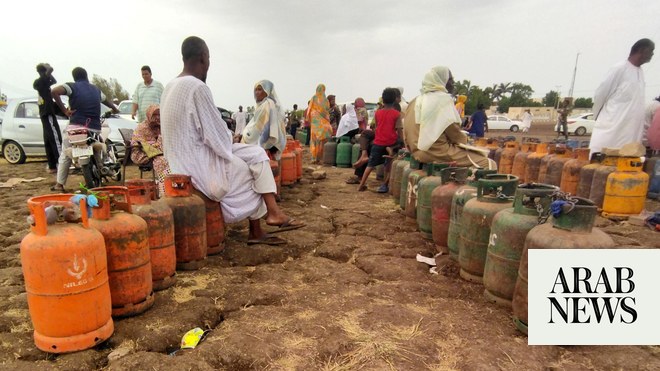
Hundreds fled day and night from Baghouz, near the enclave where diehard Daesh militants are making their last stand
NEAR BAGHOUZ, SYRIA: The ferocious battle for Daesh’s last bastion in eastern Syria entered its fifth day on Wednesday, as exhausted families left the ever-shrinking scrap of land where holdout militants have been boxed in by Kurdish-led forces.
Hundreds fled day and night from Baghouz, near the enclave where diehard Daesh militants are making their last stand, as plumes of grey smoke billowed into the sky over the flat, desolate town.
After a pause of more than a week to allow out civilians, the Syrian Democratic Forces (SDF) declared a final push to retake the pocket of land from the extremists on Saturday, aided by the warplanes and artillery of a US-led coalition.
SDF spokesman Mustafa Bali said on Tuesday that 600 civilians had fled the combat zone overnight and the Syrian Observatory for Human Rights, a Britain-based war monitor, said another 350 made it out that day. The SDF have built up a pair of sand embankments on a scrubby plateau overlooking Baghouz.
Most of the neighborhoods visible along the hazy horizon are under their control, but the southernmost parts of the small town — from which sounds of a firefight can be heard — are still held by Daesh.
Suddenly, black dots appeared on the dirt road that snakes across the plain from the ruins of the town.
The SDF watched them warily at first, but as the group of about 25 people got closer, members of the Free Burma Rangers volunteer medical group scrambled down the hill to meet them.
There are no other NGOs or UN agencies at the site.
Half a dozen among the new arrivals were adult men. The rest were women, panting after their long trudge out of Baghouz, and young children with dirty hair. About half were Ukrainian or Russian women and their children, while most of the others were Syrian.
A 34-year-old woman from Crimea tore pieces of bread to give her three children. She identified herself as Umm Khaled and said she came to Syria five years ago after divorcing her Tatar husband.
Once there, she married an Azeri Daesh member and had two other children. “They are all fatherless now,” she told AFP in broken Arabic, her voice shaking.
Coalition spokesman Sean Ryan said US-backed forces were facing a fierce fightback.
“The progress is slow and methodical as the enemy is fully entrenched and” Daesh militants continue to conduct counter attacks, he said. On Monday, the Observatory said a coalition airstrike killed 16 civilians.
An Italian journalist was also wounded as he covered the clashes and evacuated for treatment, a colleague said on Twitter.
The SDF launched the battle to expel Daesh from the eastern Syrian province of Deir Ezzor in September, slowly tightening the noose around the militants and their families since December.
In the past two months, more than 37,000 people, mostly wives and children of Daesh militants, have fled into SDF-held areas, the Observatory says.
That figure includes some 3,400 suspected militants detained by the SDF, according to the monitor.
At a gathering point for new arrivals, dozens of men knelt on the ground.
Iraqi and Syrian women and children prepared to make the journey north to a Kurdish-held camp for the displaced, after spending the night in tents.
A very thin child with dark circles around his eyes stumbled onto a truck, as other children screamed out for water and their mothers asked how long the drive would take.
“Six hours? In the cold?” shouted a wrinkled Iraqi woman.
The SDF on Saturday said up to 600 militants could still be inside the pocket, adding their leader Abu Bakr Al-Baghdadi was likely not there.
At the height of their proto-state, Baghdadi’s followers implemented their brutal implementation of Islamic law in an area the size of Britain.
Once the “caliphate” is declared over, the fight will continue to tackle Daesh sleeper cells, the SDF and their allies have said.
US President Donald Trump on Monday said the coalition may declare victory over Daesh in the region within days.
During an unannounced visit to Baghdad on Tuesday, acting Pentagon chief Patrick Shanahan met Iraqi Prime Minister Adel Abdel Mahdi but the possibility of US troops in Iraq deploying into Syria for operations against Daesh “just did not come up” during their talks, Shanahan told reporters.
Separately on Tuesday, the Syrian government and rebels exchanged prisoners in the country’s north as part of a peace process brokered by Russia, Iran and Turkey, the Turkish government said.












